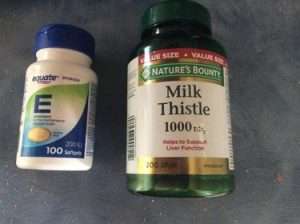Pip’s Story/Interview

Introducing Pip, the 16 year old, longest living dog with liver disease (that I know of)!
This amazing pup’s story is sure to inspire hope in you for your four-legged ‘liver dog’ and companion. Through a natural home-cooked diet, supplements like Milk Thistle and Vitamin E, and a whole lot of love, this special pooch has lived for 9 years after being diagnosed with liver failure and given only weeks to live. His story provides hope that healing is always possible – hope that there may still be hope for healing liver disease in your own beloved fur baby.
I hope you enjoy reading about this remarkable canine, and his 2.0 pet parent Liza, to learn more about the natural alternative treatment that saved his life and has kept his small cirrhosis liver ongoing for 9 years.
Tell me your name, where you live, and how you got Pip.
 My name is Liza Dawber, and Pip is my Jack Russell Terrier. We live on 7 acres in Alberta, Canada.
My name is Liza Dawber, and Pip is my Jack Russell Terrier. We live on 7 acres in Alberta, Canada.
We adopted Pip in 2011 from a family in Calgary. He was being kept in an apartment confined to the laundry room as they had a toddler he had nipped a couple of times. Any rescues would have destroyed him so we adopted him as a 4-year-old.
He was extremely food aggressive and a bossy aggressive little man in general, so we spent the first few weeks figuring each other out. The main thing was exercise, so we made sure he had plenty of that. We are surrounded by several lakes and he loves to swim so that was a great outlet for his energy too.
When was Pip diagnosed with liver disease?
 In early 2014 my beloved 7-year-old Jack Russell Terrier Pip was diagnosed with acute liver failure. We did blood tests (several), and x-rays. The blood testing machine could only test ALT’s to 1,000.
In early 2014 my beloved 7-year-old Jack Russell Terrier Pip was diagnosed with acute liver failure. We did blood tests (several), and x-rays. The blood testing machine could only test ALT’s to 1,000.
His blood even watered down by 50% was showing 1,000. So we never knew whether the ALTs were 1,001 or 5,000. (Normal range is between 12-118.) According to the x-rays his liver was very small and likely highly cirrhotic.
It was felt he wouldn’t live long enough for more invasive tests, and we live in rural Canada so we would have to travel for hours to get to a centre with more advanced testing equipment.
What was the prognosis?
My vet offered no hope, handed him to me with a prognosis of 2 weeks, maybe a month, and advised a regimen of medications and the Royal Canin prescription diet (Pip is horribly allergic to chicken, so I refused that as I didn’t want his last few weeks to be in an itchy state). A small bag of this food was $90 CAD
What was the treatment plan from Vet?
Do you know what caused his liver failure?
But in the spring of 2013, a community upstream suffered a horrible flood, and the water sat in the community for 3 months before being finally pumped out and into the rivers. Unfortunately, this meant that the septic systems in the community had flooded too so there was high contamination in the water. By August, Blue Green Algae had bloomed unbeknown to all of us and we believe this is likely to be the cause of his original liver failure.
By the following February he must have reached the point where he started to show symptoms of liver failure, the other thing about Jack Russell’s is they are about the toughest, most stoic breed you are likely to come across. It was only when I noticed the bright orange pee in the snow that I took him to the vet. The vet kept him for 3 nights on IV fluids as his ALTs were off the charts, she then called us in to collect him with the news that he had 2 weeks, maybe a month. I asked – doesn’t the liver regenerate and she said no according to the x-rays his liver was very small and likely highly cirrhotic. I was advised to put him on their prescription diet along with antibiotics and steroids. I cried all the way home and for 2 days with him lay in my arms sleeping the whole time.
What did you do after the diagnosis?
After speaking with you I stopped the antibiotics and steroids as I felt I had nothing to lose from following your advice. My vet had given him a month at the most and he was very sick. I fed him the liver cleanse diet of potatoes, veggies, and white fish.
I contacted my vet about the plan and she was quite upset and dismissive. I explained that the prescription diet is chicken which he is highly allergic to, and I felt that any meds going through his liver right now would likely stress it further. I explained that I felt I had nothing to lose and she had given us at most a month together, and if he did pass I needed to feel that I had tried EVERYTHING to save him.
What were the results of following the natural alternative treatment in the book - Hope for Healing Liver Disease in Your Dog?
 Fortunately for Pip, we found Hope for Healing Liver Disease and followed the recommendations (Milk Thistle, Vitamin E, and home-cooked liver cleanse diet of cod, potatoes, and veggies) laid out in the book much against vet advice. Within a month he was feeling better. After three months of the liver cleanse diet all of his enzyme levels were back within normal ranges. Within a year his liver was completely normal.
Fortunately for Pip, we found Hope for Healing Liver Disease and followed the recommendations (Milk Thistle, Vitamin E, and home-cooked liver cleanse diet of cod, potatoes, and veggies) laid out in the book much against vet advice. Within a month he was feeling better. After three months of the liver cleanse diet all of his enzyme levels were back within normal ranges. Within a year his liver was completely normal.
 I am so glad we followed your advice, Cyndi. He has a great team supporting him. My vet was very impressed with the results, and we have managed to keep him fit and healthy for 9 years.
I am so glad we followed your advice, Cyndi. He has a great team supporting him. My vet was very impressed with the results, and we have managed to keep him fit and healthy for 9 years.
On his 14th birthday, we took him for his checkup and his blood work was fantastic. Quote from my vet ‘I can’t believe he is 14, he is the picture of health’. Thank you again, Cyndi, for saving our little man’s life.
How long did you continue the natural approach of a home-cooked diet and supplements? What if anything did you change?
For veggies I use: carrots, celery, several different squashes (acorn was a big hit but horrible to peel), peas, canned corn, broccoli, and cauliflower. I tried him with cabbage but that was a huge no.
He loves spaghetti squash, I baked that either in the oven with a bit of olive oil or in my air fryer. Always a third of 3 veggies.
In an emergency canned pumpkin but he got bored of that fast.
Mostly fresh, except peas and corn. I do grow some veggies too so the squash, carrots, and celery were generally homegrown.
I use approximately a 1/3rd ratio of each (protein, carb, veggies).
I used to make it monthly and freeze it, being a small dog it was easy to freeze in daily portions (2 meals). If I forgot to take some out I would give him a baked potato with cottage cheese or low-sodium tuna as an emergency.
He gets organic grain-free peanut butter cookies, and small bully sticks as a treat to keep his teeth healthy. And he likes to share mom’s popcorn.
Have to admit 9 years of cooking for him was tiring. Plus other members of my family got miffed when they would come home.. “that smells good, what are we having for supper?” It’s for the dog.
I was giving him fish oils but switched to camelina oil about 6 months ago. The camelina oil I started giving them after researching kidney failure in one of my horses. The camelina oil seemed to have reversed whatever was causing the kidney failure so I give a tiny bit to each dog now too as a preventative, they love the taste and accept it better than fish oils and the Camelina has omegas 3, 6, and 9.
Was your Vet in support of the natural alternative approach that you took?
How did your Vet respond to the results?
Did you ever switch back to a commercial diet? Which one(s) did you feed?
Did you ever stop giving supplements/medications? Which ones?
Which supplements, if any, do you give him today? How much does Pip weigh?
 Pip weighs about 16 lbs. He continues to take 250 mg of milk thistle extract (1000 mg milk thistle seed) and 200 IU of Vitamin E once a day. He also takes Denamarin for his liver, Apoquel, and Camalina oil to help with his dry skin and allergies, and Vetri-Science Canine Multi-Vitamin.
Pip weighs about 16 lbs. He continues to take 250 mg of milk thistle extract (1000 mg milk thistle seed) and 200 IU of Vitamin E once a day. He also takes Denamarin for his liver, Apoquel, and Camalina oil to help with his dry skin and allergies, and Vetri-Science Canine Multi-Vitamin.
I have also been giving him tums when he seems to have an upset tummy.
How is Pip today?
 Pip turned 16 years old on November 2, 2022, 9 years after his initial liver diagnosis.
Pip turned 16 years old on November 2, 2022, 9 years after his initial liver diagnosis.
We were on a walk in a wilderness park last winter and we surprised a female Moose and her baby, he decided to take her on and came off the worst for the encounter, I truly thought he was going to die, and it was only the intervention of my Rhodesian Ridgeback that got her attention long enough for me to scoop him up and run. Fortunately, he came through shaken and with a tiny scratch on one toe. I think that was another of his nine lives gone. He had taken on dogs many times his size that wanted to sniff him in inappropriate places, the mama moose, several honey badgers, and cows that got too close to Mom. He is a killer of small furry things but is afraid of cats.
 He has developed a heart murmur in the last 2 years, he is deaf and mostly blind. He is on Apoquel for allergies and has been since before the liver failure. I don’t believe any of these are related to liver failure – just his age.
He has developed a heart murmur in the last 2 years, he is deaf and mostly blind. He is on Apoquel for allergies and has been since before the liver failure. I don’t believe any of these are related to liver failure – just his age.
He sleeps a lot now and wants to be close to me at all times. I feel as though he feels unwell and has bad days, then 5 minutes later he is emptying his toy box and brings all his toys to show me.
He still loves his walks but is slower on them, when I get out the agility equipment he is still game but has had enough and goes indoors after 10 minutes or so. Living on the acreage he uses the cat flap to come and go as he pleases. Even though he is mostly deaf he can still hear a gopher squeal when he wants to. He was still catching and killing gophers and mice last summer.
He is my shadow and my best buddy. My vet credits the diet, the supplements, all of our hard work, and the fact that he is a tough little terrier. He tries to bite her every time she takes blood and she calls him ‘her favourite little a-hole’. I am good with that.
What would you like to tell pet parents?
What have you done to increase his longevity? Do you vaccinate? Heartworm medications? Flea & Tick medications? Pesticides? Filtered water? Brush your dog’s teeth? Exercise? Playdates? Enrichment?
- I vaccinated him as a puppy then titer test every 3 years, the titers have come back high so never needed to be vaccinated. Pip’s were borderline last time but again we are fortunate to live where we do and rarely come into contact with other dogs or the likelihood of infection.
- No heartworm medication, it is not a problem in Alberta Canada.
- No flea medication. He is short coated so when he gets fleas from going down gopher holes I use a flea comb and remove them manually.
- I use non-toxic household cleaners – Orange TKO or just vinegar and Dawn Dish soap.
- I don’t use pesticides or fertilizer (no round-up).
- We are on well water which is high in Iron.
- We don’t brush his teeth, just chew sticks – he has great teeth.
- We feed him from clean stainless steel or ceramic bowls for each meal.
- Agility was our favourite until about 3 years ago. We did agility a couple of times a week in a class and have our own equipment for play dates at home. He also liked to run alongside the horses when I rode for about 4 or 5 miles, he always loved his walks. For the last 6 months, I let him do as he pleases through the cat flap.
- I have 2 other dogs although as a Jack Russell, he is far too superior to play with them and turns his head and pretends they don’t exist. Friends’ dogs come over quite often.
- When he was younger to keep him quiet he liked a stuffed Kong.
Conclusion
After reading my interview with Liza about her beloved 16-year-old ‘liver dog’ Pip, I hope that other pet parents are inspired by Pip’s healing. By making changes to his diet, such as a natural home-cooked diet for liver disease, along with supplements like Milk Thistle and Vitamin E, pet owners can give their dogs the best chance of surviving and thriving despite their liver disease. The knowledge needed to heal canine liver disease is available – let’s all hope together that this information helps our four-legged friends receive the treatment they need!
Disclaimer: This treatment does not work for every dog or every type of liver related illnesses. It’s not the answer to all of your dog’s needs. It does not replace the need of a qualified Veterinarian. Please read the full Disclaimer and Word of Caution
